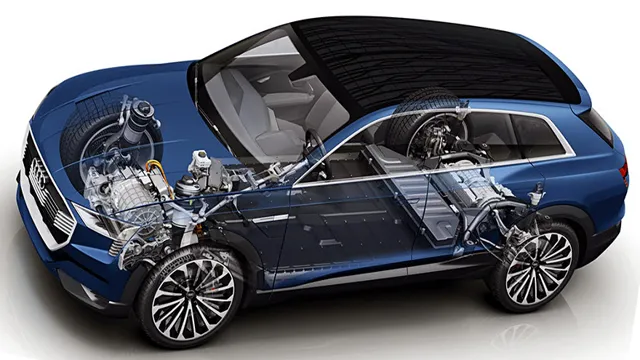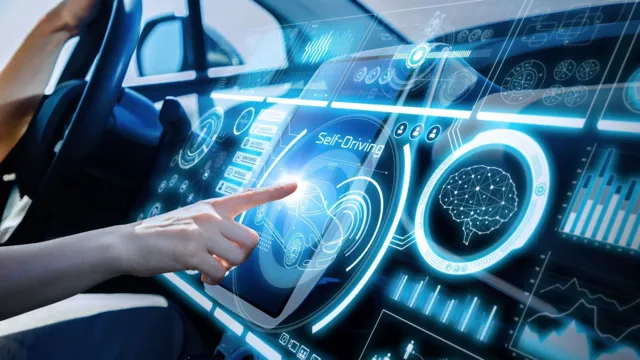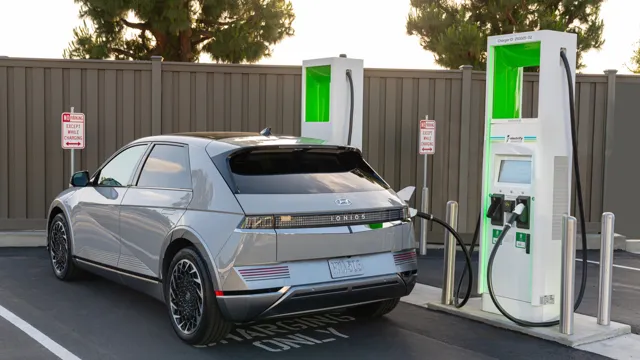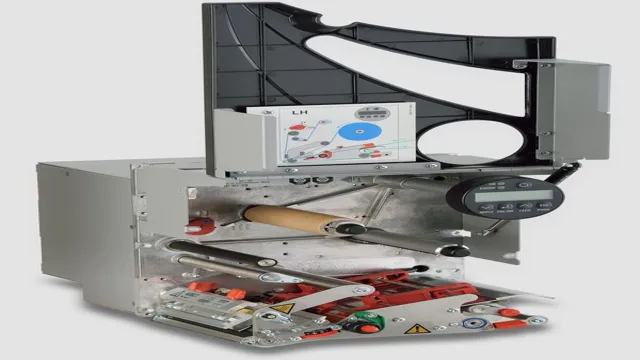Revving Up the Future: How Electric Cars Technology Continues to Improve
Electric cars have been gaining more and more attention in recent years as the world shifts towards cleaner and more sustainable modes of transportation. As technology advances, electric cars have become a more viable option for drivers who are concerned about the environment and the future of our planet. But what is the current state of electric car technology? How far have we come and what can we expect in the future? These questions have been on the minds of many people as the push towards sustainable transportation continues to gain momentum.
In this blog post, we’ll explore the history and current advancements in electric car technology, as well as what we can expect in the years to come.
Current Electric Car Technology
Electric car technology is constantly evolving, and there are already several advancements that are making electric cars more convenient and affordable for consumers. For instance, battery technology is improving, resulting in longer-lasting and more efficient batteries. This means that electric cars can travel farther on a single charge and can charge faster than ever.
Additionally, more charging stations are being installed, which means electric car owners have more access to places to charge their cars. Furthermore, companies are now producing more affordable electric cars, making them accessible to a wider audience. However, there is still room for improvement as the cost of electric cars is still higher than traditional cars, and the charging time can still be a challenge.
Nevertheless, the current state of electric car technology is promising and shows significant potential for further improvement in the future.
Battery Technology Advancements
Battery technology advancements have been making waves in the electric car industry. Currently, most electric cars use lithium-ion batteries which have shown significant improvements in recent years, leading to greater ranges and improved efficiency. However, researchers are still working to develop even better battery technology, including solid-state batteries and lithium-sulfur batteries.
Solid-state batteries offer potential benefits such as higher energy density and improved safety while lithium-sulfur batteries have the potential for even higher energy density. As these advancements continue to evolve, it paves the way for even more efficient and longer-lasting electric cars in the future. With these technologies in development, the potential for electric vehicles to become more mainstream is increasing, benefiting both the environment and consumers.

Charging Infrastructure Improvements
Electric car technology has come a long way in recent years, with significant improvements in battery life and charging infrastructure. One of the main challenges of electric vehicles is their limited range, but with advancements in technology, newer models can now travel further without needing to be charged. At the same time, the charging infrastructure is also improving, with more charging stations cropping up across the country, making it easier for people to charge their vehicles on the go.
These charging stations are also becoming faster and more efficient, with the introduction of fast charging technology that can charge an electric car in a matter of minutes rather than hours. As more and more people switch to electric vehicles, the demand for charging stations will continue to increase, leading to further improvements and innovations in this area. With these advancements in technology and infrastructure, the future of electric cars looks bright, providing a cleaner, more sustainable way to travel.
Barriers to Electric Car Technology Improvement
Electric cars are becoming increasingly popular as people seek to reduce their carbon footprint and contribute to a cleaner environment. However, there are still significant barriers to improving the technology of electric cars. One major challenge is the limited range of electric cars, which is often less than that of traditional gasoline vehicles.
This is due in part to the current state of battery technology, which is not as advanced as it needs to be to provide the same level of energy density as fossil fuels. Another significant barrier is the lack of charging infrastructure, which makes it difficult for drivers to use electric cars for long trips or in areas without charging stations. Additionally, the high cost of electric cars and limited availability of models can also be a deterrent.
Despite these challenges, there is a growing demand for electric cars, which is driving research and development into improving the technology. Advances in battery technology, charging infrastructure, and production processes are making electric cars more practical and cost-effective, and it is likely that this trend will continue as more people switch to electric cars.
Limited Range
Electric car technology has come a long way in recent years, but there are still several barriers that need to be addressed before it can truly become mainstream. One of the main challenges is the limited range of electric vehicles. While modern EVs can travel farther than ever before, they still can’t match the range of traditional gasoline-powered cars.
The limited range makes them less convenient for long-distance travel and can be a major obstacle for drivers who don’t have easy access to charging infrastructure. The good news is that advancements in battery technology are already underway to help address this issue. With continued research and development, it’s only a matter of time before electric car range becomes a non-issue.
Cost
Electric Car Technology Improvement One of the main barriers to improving electric car technology is cost. While electric cars are becoming increasingly popular, they are often much more expensive than traditional cars. This is due to the high cost of the batteries and other components needed to power the vehicle.
However, as demand for electric cars increases, the cost of producing them is going down, making them more affordable for consumers. Additionally, government incentives and tax credits are being offered to encourage people to purchase electric cars. As more people move to electric vehicles, the cost of batteries and other components will continue to decrease, making the technology more accessible and affordable for everyone.
Despite these cost barriers, electric car technology is improving rapidly and will only continue to get better in the years to come.
Infrastructure
One major barrier to the improvement of electric car technology is inadequate infrastructure. While electric vehicles have been gaining popularity in recent years, there are still not enough charging stations to support widespread adoption. In many areas, the number of charging stations is not enough to meet the demand.
This can be inconvenient for electric vehicle owners, as they may be forced to travel out of their way to find a charging station. Additionally, the charging process can be time-consuming, particularly if the charging infrastructure is not up to date. As a result, electric car adoption may be limited until infrastructure is improved.
Without a sufficient number of charging stations, it’s difficult to imagine a world where electric vehicles are the norm. Therefore, governments and private companies should collaborate to create easier access to charging solutions, which would encourage more people to embrace electric vehicles as their primary mode of transportation.
Innovations in Electric Car Technology
Electric cars technology is continuously improving, thanks to numerous innovations that are enhancing their efficiency, reliability, and performance capabilities. One of the latest trends is the development of more advanced batteries with higher energy densities, longer lifespans, and quicker recharging times. This means that electric cars are now capable of traveling longer distances on a single charge, and that charging times are becoming more comparable to traditional refueling times.
Additionally, new propulsion systems are being developed, such as in-wheel motors, which offer better traction, greater maneuverability, and lighter weight. Furthermore, automakers are exploring the use of advanced sensors and artificial intelligence to improve their cars’ self-driving capabilities, making electric cars an even more attractive option for those looking to reduce their carbon footprint. Overall, the future of electric cars is bright, and we are likely to see a rapid acceleration of new innovations in the years to come.
Solid State Batteries
Innovations in electric car technology are making great strides, and the latest development is the solid-state battery. This next-generation battery technology promises to revolutionize the automotive industry by delivering more energy, faster charging times, and improved safety than traditional lithium-ion batteries. Unlike lithium-ion cells, solid-state batteries replace the liquid electrolyte with a solid-state material, which increases their energy density.
Greater energy density means electric cars can drive longer distances on a single charge, and solid-state batteries promise to deliver double the range of current lithium-ion batteries. With faster charging times and improved durability, solid-state batteries could provide the tipping point for electric cars to become mainstream. Electric vehicles can also become more affordable since the battery is the most expensive part of an EV.
The technology is still in development stages, but it’s safe to say that solid-state batteries will be the future of electric car technology.
Wireless Charging
Electric Car Technology One of the most significant innovations in electric car technology in recent years is wireless charging. This technology allows vehicles to charge without the need for cords or cables, and it has the potential to revolutionize the way we power our cars. The process involves a charging pad that uses an electromagnetic field to transfer energy between the pad and a coil located in the car’s battery.
This method is much less complicated than traditional charging methods, which require cables to be plugged into the car and a power source. But with wireless charging, cars can simply park over a designated charging pad, and the charging process starts automatically. As the demand for electric cars increases, wireless charging technology will play a critical role in making electric cars more convenient and widespread.
The Future of Electric Car Technology
As the world shifts towards sustainability and reducing carbon emissions, electric cars have jumped to the forefront as a viable alternative to traditional combustion-engine vehicles. However, with current technology limitations such as limited driving range and long charging times, there is still a long way to go in terms of improving electric cars. But, as technology continues to evolve, we can expect significant improvements in the future.
For instance, battery technology is already advancing, which will lead to longer driving ranges and faster charging times. Additionally, autonomous driving technology will also play a significant role in improving electric cars by optimizing driving patterns and reducing energy consumption. As energy storage technology improves, electric cars will no longer have to rely solely on batteries but could be powered by an array of sources such as hydrogen fuel cells, solar power or even wireless charging.
The future of electric car technology is exciting and full of possibilities, and we can expect to witness tremendous improvements in the years to come.
Conclusion
In conclusion, electric car technology continues to improve and evolve, paving the way for a greener and more sustainable future. With advancements in battery technology, charging infrastructure, and vehicle design, electric cars are becoming more accessible and more appealing to consumers. The shift towards electric vehicles may seem like a daunting challenge, but with innovation and collaboration, we can electrify our transportation systems and help protect our planet for generations to come.
So why not make the switch to electric? After all, with an electric car, the only gas you’ll be guzzling is the one that makes you go, “Wow, this is amazing!”
FAQs
How has electric car technology improved over the years?
Electric car technology has improved significantly over the years with advancements in battery technology, motor efficiency, and charging infrastructure. Today’s electric cars can travel farther on a single charge and charge more quickly than their predecessors.
What are the benefits of electric car technology?
Electric car technology offers several benefits, such as zero emissions, lower fuel costs, and reduced dependence on foreign oil. Additionally, electric cars can be cheaper to maintain and have a quieter and smoother driving experience.
What challenges does electric car technology face?
Despite advancements, electric car technology still faces challenges such as range anxiety, lack of charging infrastructure, and high upfront costs. Addressing these challenges will be critical to wider adoption of electric cars.
What role does renewable energy play in electric car technology?
Renewable energy plays a crucial role in electric car technology, as it provides a clean source of energy to power the vehicles. With the expansion of renewable energy, electric cars can become even more sustainable and reduce their carbon footprint.



